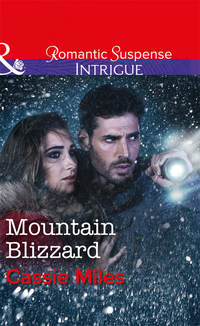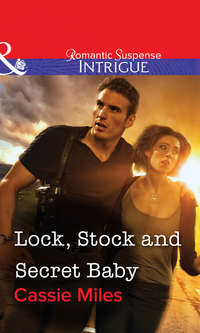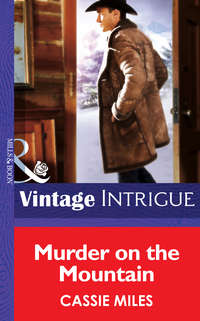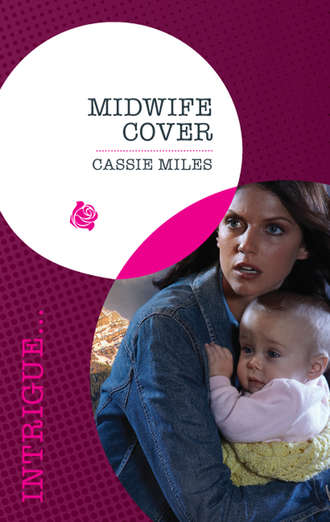
Полная версия
Midwife Cover

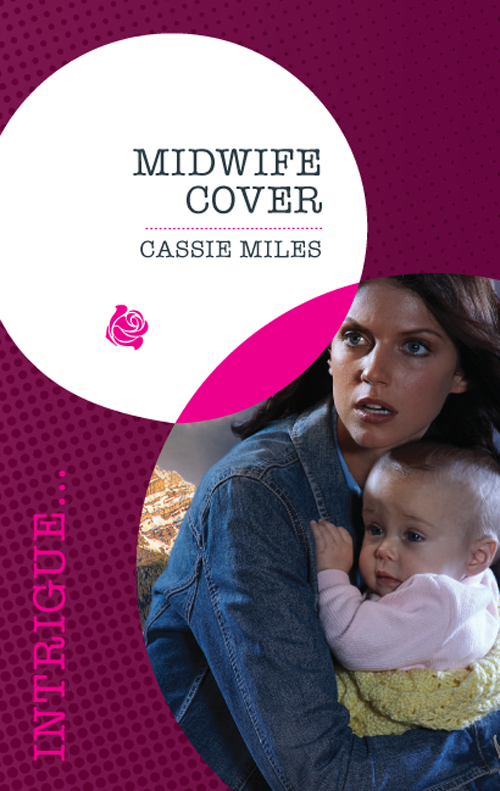
“There’s only one thing this baby needs. His mother.”
The infant she held in her arms had switched on all her protective instincts. She couldn’t just hand him over and walk away. “I’m coming with you.”
“I can’t sanction that,” Brady said.
Still holding the baby, she left the room and went down the hall to one of the desks behind the counter. “What I do is my decision. Not yours.”
She slipped into her lightweight summer hiking shoes and unlocked her bottom desk drawer. In the back of the drawer, she found her Glock automatic, loaded a clip and snapped the gun in a holster onto her belt.
She stood to face him. Brady was over six feet tall, and she was only five feet, seven inches. She had to tilt her chin to look him straight in the eyes. She wouldn’t mind getting to know him better, even if it meant putting up with his arrogance.
And putting up with the way her heart raced in his presence.
About the Author
Though born in Chicago and raised in LA, USA Today bestselling author CASSIE MILES has lived in Colorado long enough to be considered a semi-native. The first home she owned was a log cabin in the mountains overlooking Elk Creek, with a thirty-mile commute to her work at the Denver Post.
After raising two daughters and cooking tons of macaroni and cheese for her family, Cassie is trying to be more adventurous in her culinary efforts. Ceviche, anyone? She’s discovered that almost anything tastes better with wine. When she’s not plotting Mills & Boon Intrigue books, Cassie likes to hang out at the Denver Botanical Gardens near her high-rise home.
Midwife Cover
USA Today Bestselling Author Cassie Miles

www.millsandboon.co.uk
To the memory of Tony Chesnar, a great guy and
a great friend. And, as always, to Rick.
Chapter One
The sooner this investigation was over with, the better. After eight months in the field, Special Agent Brady Masters had reached the end of his patience. He was more than ready to return to Quantico and had paid extra, out of his own pocket, to hitch a ride on a charter flight from Albuquerque to the Grand County Airport outside Granby, Colorado.
As he disembarked from the small plane onto the tarmac, he kept his head down. The unobstructed view from the unmanned airfield on the Grand Mesa was no doubt spectacular, especially now at sunset with the blood-red skies and the clouds traced with gold, but Brady didn’t give a damn about the landscape.
He’d been here for all four seasons, from winter to spring to summer and now fall. The clear air, rugged plains and distant snow-capped peaks had ceased to astound him; his career path was back east where he was being considered for a profiler position with an elite team in the Behavioral Analysis Unit. All he needed to do right now was tie up one last loose end. Then, it was bye-bye Rocky Mountains.
Waiting outside a hangar at the end of the airstrip was Special Agent Cole McClure. They’d met before, and Brady knew enough about Cole’s background to appreciate the kick-ass skills of the former undercover specialist who now worked in the Denver field office.
“Where are we headed?” Cole asked as they strode side by side toward his black SUV.
Brady handed over a piece of paper on which he’d written the address and directions given to him over the phone by an informant. “If this tip pays off, we’ll need backup from local law enforcement.”
“Not a problem.” Cole opened the car door and got behind the steering wheel. “I know the locals. My wife used to live around here. She delivered a baby for one of the deputies.”
Brady fastened his seat belt. “Is your wife a doctor?”
“A midwife.”
“You have a baby of your own, right?”
“Emily.” As soon as he spoke his daughter’s name, Cole transformed from a hard-edged federal agent into a fuzzy teddy bear with a badge. “She’s ten months old. A beauty like her mom, and she’s almost walking.”
“And talking?”
“She says dada.” He cleared his throat and wiped the goofy grin off his face, returning his focus to FBI business. “What’s our plan here? Brief me.”
“As you know, I’m part of the ITEP task force.”
“Illegal Transport and Exploitation of Persons,” Cole said, spelling out the acronym. “I’ve heard that your team has had some success.”
“Not enough.”
They were investigating an interlinked human trafficking operation that had spread like a virus across the southwestern states from San Diego to Salt Lake City to Dallas. Even though the task force had arrested several individuals, they were playing a game of Whack-a-Mole. Each time they nabbed one, two more popped up.
“How did you get this assignment?” Cole asked.
“I’m a profiler and psychologist, specializing in interrogation. It’s my job to get these guys to talk. The problem is that most of them don’t know much. They’re little more than delivery boys who happen to be transporting human cargo. In their minds, this is just a job.”
Brady was sick of hearing their excuses, disgusted by their unintended cruelty and their indignation when they were arrested. These delivery boys weren’t psychopaths, but they lacked empathy and basic decency. While they did their “jobs,” they managed to ignore the fact that eighty percent of their cargo were women and children who would be processed into lives of forced labor, servitude, prostitution and worse.
“The lead we’re following,” Brady continued, “comes from a guy by the name of Escher who seems to have grown a conscience. He gave me a location that’s used as a dropoff point—an abandoned house with a three-car garage. The property belongs to his eighty-nine-year-old grandma who doesn’t live there anymore.”
Cole steered the SUV onto a two-lane road leading into the hills covered with pine forests and gold-leafed aspen. “Over the river and through the woods to grandmother’s house we go.”
“Spoken like the father of a ten-month-old.”
“What about you, Brady? Married?”
“Not yet.”
“But you’re looking?”
He shrugged. He didn’t like to think of himself as a stubborn bachelor who was wedded to his career, but with each passing year, that identity was becoming more solidly fixed. “My twin sister says that if I don’t get married soon, I’ll turn into an obsessive-compulsive old fart who spends his days organizing his sock drawer and alphabetizing his canned goods.”
Her analysis wasn’t all that far-fetched. He had, on occasion, wondered if pinto beans should be filed under P for pinto or B for bean.
“You’re a twin?”
“My sister is an agent, too. Based in Manhattan, married with one kid. She works cybercrimes.”
“Do you look alike?”
“You tell me.”
Brady pulled out his cell phone and flipped to a photo of himself and Barbara taken a few months ago on their thirty-second birthday. Their coloring was similar with dark blond hair and gray eyes. They both had high foreheads and square jaws, but the resemblance ended there. Nobody had ever called Brady cute, but that word perfectly described Barbara’s huge smile, button nose and twinkly eyes. In the photo, she was tossing her head, laughing.
Cole said, “She’s a lot prettier than you.”
“As it should be.” He tucked the phone back into his pocket. “How much farther?”
“According to the numbers on the mailboxes by the road, we’re getting close. Maybe a mile or so.”
“Are you wearing a vest?”
“Nope. Are you?”
“I am.” He’d spent extra for a brand of lightweight, concealable body armor developed by the Israelis. In the field, Brady always wore a protective vest under his button-down white shirt and black suit coat. Those were the rules. “We can stop if you want to get into gear.”
Cole shrugged. “I’ll take my chances.”
An interesting choice, Brady thought. Even though Cole had settled down and was a proud papa, he still exhibited the risk-taking behavior of an undercover operative. People could modify their behavior, but few really changed.
The road meandered through a forest that was sparsely settled with what looked like summer vacation cabins. This was a good area for a hideout—close enough to main roads for a quick getaway and secluded enough to be off the radar.
Cole turned left at a nearly indecipherable street marker for Wigwam Way. The house nearest to the corner was a quaint barn that had been remodeled into a house with a large window where the hayloft would have been. On the opposite side was a cheerful log structure with red shutters, plastic flowers in window boxes and a burned wood sign that said Welcome to the Peterson Place.
A hundred yards down the road, the charm faded as quickly as the dusk that spread shadows across the land. Scratchy letters on a rusted mailbox spelled out Escher, the name of his informant. Inside a four-foot-tall chain-link fence was a ramshackle bungalow. At one time, this little house might have been pretty, but the stucco was cracked, weathered and filthy. Weeds reached as high as the windows, many of which were busted. The gate across the driveway hung open as though someone had left in a hurry.
“That’s the address.” Cole drove past without stopping. “How do you want to proceed?”
“The front door was ajar. The place could be abandoned.”
Brady was disappointed that they weren’t closing in on suspects, but he wasn’t surprised. The phone call from Escher had been hasty. His tone was angry but frightened; he was about to bolt.
At a wide spot in the road, Cole turned the SUV around. “I didn’t see any vehicles, but there was the big garage.”
“Like my informant said.”
The three-car garage, a cheap prefab with vinyl siding, would make a good holding pen for human cargo. If there were prisoners, there would also be armed-and-dangerous guards.
Brady considered calling for backup before entering. In a city, he would have done so, but organizing a police presence in the mountains took a hell of a lot more time and effort. He wanted to get this loose end tied up and head back to Quantico.
He drew his Beretta and checked the clip. “Pull up to the front door. We’ll search the house first.”
“You got it.”
Cole drove back, whipped down the driveway and slammed on the brake. Brady was out of the car as soon as it stopped moving. Gun in hand, he charged toward the open door. The interior of the house was dark and dirty. A torn bedsheet hung from the curtain rod across the front window. Tattered furniture crouched on an olive green carpet. Fast food wrappers littered a coffee table along with the remains of fried chicken in a bucket. The still-greasy chicken showed that someone had been here recently.
Brady entered a narrow hallway with a bedroom at each end and a bathroom in the middle. In the front bedroom, he found a bare mattress and ragged blankets. The closet held a pile of stained clothing, both men’s and women’s.
The grime in the bathroom defied description.
The second bedroom had yellowed newspapers duct-taped over some of the windows. On the floor was a body, sprawled on his back with both arms thrown over his head and one leg doubled under him in a grotesque, horizontal pirouette.
Brady turned on the overhead light and called to Cole. “In here.”
There was no point in feeling for a pulse. Half the man’s head had been blown away. Brain matter spattered the peeling gray wallpaper, and blood puddled on the hardwood floor. Brady hunkered down beside the dead man.
Cole entered the bedroom. “Oh, man, that stinks.”
“Rigor hasn’t set in. He hasn’t been dead for long.” Brady breathed through his mouth, not wanting to inhale the stench. He pushed the body onto his side and took the wallet from the back pocket of his baggy jeans. In the cracked leatherette wallet were two fives and a driver’s license. “It’s Escher. My informant.”
“When did he contact you?”
Brady checked his wristwatch. “Three and a half hours ago. He called me in Albuquerque.”
“He might have already been here, chowing down on a bucket of chicken.”
And preparing to die. Brady stood and turned away from the body. He’d only questioned Escher face-to-face once. There wasn’t enough evidence to arrest him, but Brady was sure that the informant had been a coyote for many years, charging exorbitant amounts of money to smuggle illegals across the border from Mexico. That was bad enough, but nowhere near as vicious as the exploitation involved in trafficking where the human cargo was never set free. In two subsequent phone calls, Brady had played on Escher’s sympathies.
Brady wondered aloud, “Why did he call me? Something must have sparked his conscience. But what?”
“Do I need to contact the Denver field office to handle forensics on the body?” Cole asked.
“We can leave the murder investigation to the local sheriff.” The people who had killed Escher were already down the road. Why had the informant called? Why did he want Brady to come to this place? “Let’s take a look in the garage.”
He picked his way through the crap scattered throughout the little house. Looking for evidence, he’d have to paw through this garbage. There wasn’t enough hand sanitizer in the world to make this right.
Outside, he sucked down a breath of fresh air. Even though he didn’t expect to find anything in the garage, both he and Cole held their guns at the ready. He went to a door on the side. There were two padlocks, but the door was standing open.
As he stepped inside, he hoped with all his heart that they wouldn’t find any other victims. He flicked a switch by the door. Light from two bare bulbs showed the detritus of former inhabitants. Clutter and rags. A couple of cardboard boxes. Bare mattresses. Sleeping bags. The stink of urine and sweat was overpowering.
Cole grumbled, “This must be what hell looks like.”
“It’s the end of the road for my investigation,” Brady said. “Escher was my last viable lead.”
He heard a rustling noise coming from the far corner. Raccoons? Rats? Brady moved toward the sound. He looked down into a cardboard box. Inside, swaddled in filthy yellow blanket decorated with sheep, was an infant with round cheeks and a tiny rosebud mouth. This was what Escher had wanted him to find.
The little arms reached toward him, and Brady scooped the baby from the makeshift nest. He snuggled the tiny bundle against his chest. “How old do you think it is?”
“Not more than a couple of weeks,” Cole said.
“You sure?”
“Pretty much. With my wife’s job, I’m around babies a lot.” He reached out and stroked the fine black hair on the infant’s head. “Doesn’t seem to be injured, but we should check it out. I know where to take this little one.”
The baby wriggled. The mouth suckled an invisible teat. Brady had nothing to feed this infant. All he could offer was a promise that he would point the abandoned child toward a better life.
Trafficking in newborns was a new and horrible twist in the ITEP investigation—something he couldn’t ignore. Brady knew he wouldn’t be returning to Quantico today.
Chapter Two
In the front reception area of the Rocky Mountain Women’s Clinic in Granby, Petra Jamison stood on her head with her elbows forming a tripod and her bare feet against the wall for support. She’d propped the front doors open to allow the early evening breezes to waft inside and dispel the faintly antiseptic smell from the examination rooms. In about an hour, a group of pregnant women would arrive for Petra’s class on prenatal yoga breathing, and she’d decided to get in the mood by playing a CD of Navajo wooden flute music and doing meditation exercises.
Even though the room was dimly lit with only one lamp on the desk behind the counter and a three-wick sandalwood candle on the coffee table, she was bathed in the warm glow of positivity. Her mind and body were in balance. The rush of blood to her brain gave her a burst of energy at the end of the day. As if she needed an evening wake-up. Petra had the circadian rhythm of a night owl, maybe because she was born at midnight. Or maybe her preference for the dark had something to do with her fair complexion—people who freckle shouldn’t go out in the sun. Or maybe …
She heard a vehicle pull into the parking lot. A car door slammed. Still upside down, she saw a man in a black suit and white shirt holding a baby in his arms. He strode toward her and leaned over, tilting his head to squint into her face. He had tense eyes and the kind of high forehead that she associated with intelligence, even though she knew hairline was nothing more than a genetically determined growth pattern. Was he smart? Or clever? Did he have a sense of humor? Probably not. This guy didn’t look like Mr. Giggle.
“Back up,” she said.
“What?”
“I need for you to back up so I can put my legs down.”
When he stepped backward, the baby started crying.
Petra lowered her legs, stood and adjusted the long, auburn braid that hung down her back. Before she could say anything, Cole McClure charged into the reception area.
“Hey, lady,” Cole greeted her. “I need your help.”
“Anything for you.” She liked Cole, even though her fellow midwife and friend, Rachel, had moved away from Granby when she married him. “How’s little Emily?”
“Perfect.” He made the introduction. “Petra Jamison, midwife, meet Brady Masters, special agent.”
“Hi, Brady.” She purposely used his first name instead of his title. The clinic was her space, and her protocol applied. In here, it didn’t matter if you were a bank president or a car mechanic—she’d delivered babies for women with both of those occupations. “May I take the baby?”
“Be my guest.”
When he transferred the tiny bundle into her arms, her fingers brushed against his chest. It was hard as a rock. “Are you wearing Kevlar?”
“It’s a protective vest.”
She glanced between the two men. Even though Cole had on a dark blazer, his jeans and blue shirt were casual. Quite the opposite, Brady matched the stereotype for men in black, right down to his body armor. His underpants were probably government-issue. “Do you mind telling me why this baby has an FBI escort?”
“Long story,” Brady said.
The poor thing was filthy, swaddled in a blanket with a sheep design. The baby’s cries were fitful. The little face twisted in a knot.
She blew out the candle and went down the hallway that was covered with hundreds of photos of families who had used the clinic over the past five years.
In a spacious lavender room with sinks, cabinets and a refrigerator, she placed the wailing infant on a changing table and removed the blanket. There was a logo in the corner and a blood stain, but she saw no wounds on the baby as she peeled off a grungy T-shirt and a cloth diaper that looked like it hadn’t been changed in a very long time. “When’s the last time this little boy ate anything?”
“Don’t know,” Brady said.
She shoved the discarded clothing and blanket aside. “You probably need those things for evidence. Trash bags are in that cabinet. Cole, would you prepare a bottle of formula? You know where everything is.”
While the two feds did her bidding, she slid a portable tub into one side of the double sink. Using a soft cloth, she gave the baby a quick wash, inspecting him for cuts and rashes. The warm water soothed his cries until he was only emitting an occasional hiccup.
“Is he okay?” Brady asked.
“I think he’s going to be just fine,” she said. “Nothing wrong with his lungs, that’s for sure.”
After she dried him off, she applied a medicinal salve to his chafed bottom, put on a biodegradable diaper and swaddled him in a clean white blanket. She took the bottle from Cole and teased the nipple into the baby boy’s mouth. After only a few tries, he started sucking.
The whole process had taken less than ten minutes; Petra was an expert. She looked toward Cole who was on his cell phone. Even though she didn’t really want to talk to Special Agent Brady, she spoke to him in a soft voice that wouldn’t upset the feeding infant. “I’d like an explanation.”
“Nothing you need to worry about,” he said. “Thanks for taking care of the, um, immediate problem.”
“Are you referring to the poopy diaper?”
He scowled as though it was below him to discuss poop. This guy was uber-intense. Tight-lipped, he said, “The infant needs to be turned over to Child Protective Services.”
“There’s only one thing this baby needs. His mother. What happened to her? Is she dead?”
“Why would you think—”
“There was blood on the blanket. A big smear right next to the logo for Lost Lamb Ranch, whatever that is. So, what happened? Did you find the baby at a crime scene?”
Even though Brady had already washed his hands, he used a spritz of hand sanitizer. “The short answer is yes. There was a crime. We don’t know where the mother is.”
“I might be able to help. I don’t know all the pregnant women in the area, but I’ve got a pretty good network. Should I ask around?”
“That won’t be necessary.” His gray eyes were cool and distant. “We have reason to believe the mother isn’t from around here.”
“On the run?” she guessed.
His expression gave nothing away.
“Is she a hostage? Or kidnapped?”
“It’s an ongoing investigation. I can’t discuss it. You understand.”
She took his condescending attitude as a challenge to figure out what was going on. The infant she held in her arms had switched on all her protective instincts. She couldn’t just hand him over and walk away.
“It must have been something terrible,” she said, “that separated the mother from her baby. In spite of how dirty he was, he’d been taken care of. Mom didn’t want to abandon him.”
Brady said nothing.
She could only think of two reasons a mother would leave her baby behind. “Either she was forced to run or she thought the baby would be safer without her. If I had to guess, I’d say that mother and baby were being transported illegally.”
“Good guess,” Cole said as he ended his phone call. “I checked in with the sheriff, and he put me through to one of his deputies who picked up an injured woman—an illegal with no green card. She kept saying that her baby was stolen.”
“How badly is she injured?” Brady asked.
“Knife wounds. A lot of blood,” Cole reported. “The deputy took her to Doc Wilson’s house. It was closer to his location than any hospital or clinic. The doc stitched her up. He says she’ll be fine.”
“We need to talk to her,” Brady said.
“I told the deputy to stay with her at the doc’s place. If anybody is after her, she could be in danger.”
Petra listened with rising concern as they discussed their plan to drive to Doc Wilson’s place. Her heart went out to this mother. She wanted to help. “I’m coming with you.”
“I can’t sanction that,” Brady said.
Still holding the baby, she left the room and went down the hall to one of the desks behind the counter. “What I do is my decision. Not yours.”
“You heard what Cole said. It’s dangerous.”
She whipped around and transferred the baby into Brady’s arms. “Keep the nipple in his mouth. He needs to get as much hydration and nourishment as possible.”
Sitting in her ergonomic desk chair, she slipped into her lightweight summer hiking shoes and unlocked her bottom desk drawer. In the back of the drawer, she found her GLOCK automatic, loaded a clip into the magazine and snapped the gun in a holster onto her belt.




